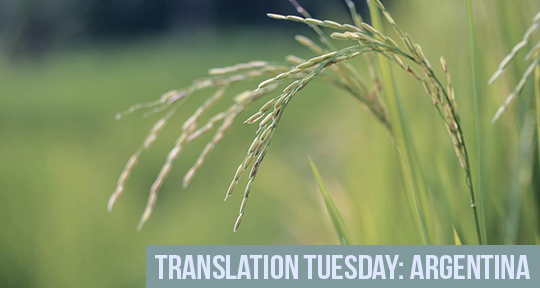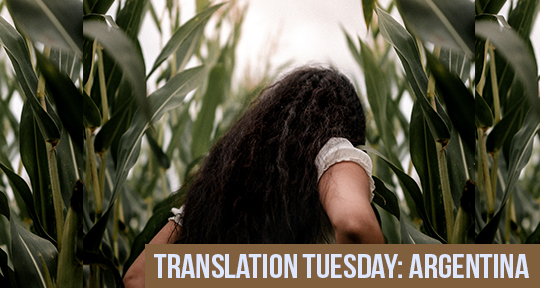This Translation Thursday, we deliver gentle prose from Argentina, a subtle study of inter-generational difference, migration, and hyphenate identity in the form of a weekly lunch date between father and daughter. Hear translator Madison Felman-Panagotacos’ impression of Japanese-Argentine author Alejandra Kamiya’s affecting Rice:
“… a precise, austere story that explores what is named, what is spoken, and, most importantly, what is left unsaid…, ‘Rice‘ quietly explores quotidian experiences as a means of capturing life’s tensions and discomfort. Her brevity in narration, so uncommon for the long-winded prose of the Argentine canon, is disquieting and moving.”
XXXToday is Thursday and on Thursdays we have lunch together.
XXXWe talk a lot—or a lot for us. Neither of us is a person others consider talkative.
XXXSometimes we even have lunch in silence. A comfortable silence, light, like the air it’s
made of, and which best expresses the flavor of what we’re eating.
XXXOther times, when we do talk, the words form little mounds that slowly become
mountains. Between one and the next we leave long silences: valleys in which we think as if we were walking through them.
XXXWe choose a restaurant in an old house in San Telmo. It has a patio in the center, a square with its own sky, always different clouds.
XXXThe conversation with my father moves at a relaxed pace.
XXXSuddenly, in the middle of a phrase, he says, “…to wash rice…” and joins his hands, making a ring with his fingers, and moves them as if he were hitting something against the edge of the table.
XXXWhat happens suddenly isn’t him saying these words but me realizing I don’t know how rice is cleaned. What happens suddenly is me realizing I know many things like this from him, without knowing them, only intuiting them.
XXXI know that my father must be holding a bunch of something in his hands that I don’t see. I search my memory for the fields of rice that I saw in Japan, and I imagine that the bunch must be that type of green reeds.
XXXI clumsily deduce that the rice must be adhering to the plants and by shaking it, it should fall. Like tiny fruits or seeds.
XXXSeeing my father’s gestures I can get to the past, to Japan, or to my father’s history, which is mine. Like the impressionists, without looking for the details but rather the light, like I am familiar with the trees on the path to my house, not knowing their names, but without being able to imagine my house without them.
XXXThis is how I talk with my father: safely but blindly.
XXXHe says, for example, that this country is “just 200 years old,” “an infant country,” he says, and next to the infant I see an old Japan, with hands whose skin covers and reveals the shape of its bones.
XXXIf he holds his head when he says that they used to run through fields of tea, I know that planes pass through the sky that I don’t see and that drop bombs.
XXXWe look at the menu and choose plates that we will share. My father never got used to eating just one dish. It was my mother who adjusted to preparing various dishes for meals.
XXXLater we talk about books. He is reading Mozart, by Kolb, and carries it with him wherever he goes. My father always carries a book and a dictionary with him.
XXXFor me, who was born and raised in Argentina, I can’t be bothered to look up words in a dictionary. But not him. My Japanese father’s Spanish is vaster and more correct than mine.
XXXHe tells me that he went to get some tests that the doctor ordered and while he waited, he read a few pages.
XXX“What tests?” I ask him. “A biopsy,” he responds.
XXXI’m worried. I feel what is lurking, and a certainty like knowing night will fall each day, a type of vertigo. Everything I hadn’t asked over the years comes back to me. Every question comes and brings others. I want to know why my father chose this country, this infant country. I want to know what it was like the day he learned the war had started, what every one of the days that followed was like until the day he got to this land. I want to know what his toys and his clothes were like, what it was like to go to school during the war, what the port of Buenos Aires was like in the 70s, if he wrote letters to my grandmother, what did they say. I want to know the colors, the words, the smell of foods, the houses he lived in. Once he told me that shortly after he had arrived, he didn’t get into the bathtub but instead washed himself beside it and only submerged himself in the water when he was clean because that is how they do it in Japan. Like that, I want him to tell me more. Much more. Everything. I want him to tell me about every day, so no time is wasted. Maybe to write it: leave it to take root with ink on paper forever. Where to start? Where do the questions start? Which is the first?
XXXI look inside, as if I were lost running in this valley of silence that had suddenly opened between words. To lose yourself in a place so vast seems like a prison.
XXXWhen I stop looking, I see the question before me as if it had been waiting for me. I look at my father and ask my question.
XXXHe smiles, takes a paper from between the pages of his book and a black pen out of the pocket of the cardigan he is wearing. He draws lines very close together, some parallel and others that cross. Then another, perpendicular and wavy, that cuts through them close to one end. They are the rice plants in water. Then he makes some very small circles at the ends: the grains. He tells me that they fill up and retraces the lines but instead of straight, they’re curvy at the ends: the plants when the rice matures. “The fuller one is, the more cultivated it is, the humbler,” he says. “One bows like the rice plant under the weight of the grains.” Then he reaches out his hands and his arms and moves them in parallel to the floor. “They would lay big cloths over the field,” he says. I imagine them white, barely rippling, like water moves when it’s calm.
XXXHe goes back to holding his hands as if he were holding a bundle and shakes it like before, against the edge of the table. Now I see it clearly, I can almost touch, the grains of rice that fall away.




